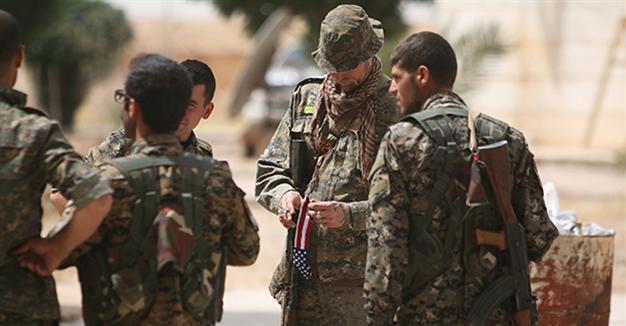Turkey offers US joint Syria operation, without the Kurds
ANTALYA - Agence France-Presse

A U.S. fighter, who is fighting alongside with Syria Democratic Forces (SDF), carries his national flag as he stands with SDF fighters in northern province of Raqqa, Syria May 27, 2016 - REUTERS photo
Turkey is offering to "join forces" with Washington for a special operation inside Syria on condition it doesn't include a Syrian Kurdish militia blacklisted by Ankara but seen as an ally by the US, the foreign minister said.
Washington's support of Kurdish fighters in Syria in the fight against the Islamic State of Iraq and the Levant (ISIL) jihadists has angered Ankara, especially after pictures last week revealed US commandos wearing patches of the Kurdish People's Protection Units (YPG) outlawed by Turkey.
"If we join forces, they (the US) have their own special forces and we have our special forces," Foreign Minister Mevlüt Çavuşoğlu told a small group of journalists at the southern holiday resort of Antalya.
"The subject we are discussing with the Americans is the closure of the Manbij pocket as soon as possible... and the opening of a second front," he said, referring to a backdoor border route favoured by ISIL for smuggling jihadists into and out of Syria.
"We say okay, a second front should be opened but not with the PYD," he said, referring to the Democratic Union Party (PYD).
Çavuşoğlu said Syrian Arab opposition forces opposing President Bashar al-Assad could be backed up with special forces from Turkey and NATO ally Washington as well as from France, Britain and Germany.
"Unfortunately, both Russia and the United States see a terrorist organisation as a partner and support it," he said of the YPG.
The minister also said that recent deal with Washington, which would have seen American light multiple rocket launchers deployed along its border with Syria to combat ISIL, had been delayed.
Under the deal, the High Mobility Artillery Rocket System (HIMARS) was to have been deployed along the Turkish border by the end of May, but Çavuşoğlu said it would now only happen in August.
"The United States is unfortunately not keeping its promise," he charged.
"We are completely ready. Not us, but the US is responsible for the delay."
Çavuşoğlu also commented on the deal with the European Union to reduce migrant flows, warning that Ankara will abandon the deal if its citizens are not granted visa-free travel to most of the bloc.
With the two sides locked in an increasingly-bitter standoff, Çavuşoğlu said it was “impossible” for Ankara to change anti-terror laws that Brussels wants to see narrowed in exchange for the visa-free travel to the Schengen zone.
“We have told them ‘we are not threatening you’ but there’s a reality. We have signed two deals with you (the EU) and both are interlinked,” Çavuşoğlu said.
“This is not a threat but what is required from an agreement,” he added.
Building on President Recep Tayyip Erdoğan’s words last week, Çavuşoğlu said Turkey would use “administrative” measures to block the deal if needed.
There have been growing concerns that Turkish nationals will not be given visa-free travel by the end of June, the target date, putting the future of the migrant deal at risk.
EU leaders are insisting that Turkey meet 72 conditions before the visa exemption is approved, including narrowing its definition of terror.
“Which definition are you talking about? Each country in Europe has different terror definitions,” the minister said, pointing to stringent measures in France.
Çavuşoğlu said Turkey was currently battling “more than one terrorist group” including the outlawed Kurdistan Workers’ Party (PKK).
“In such a circumstance, it is impossible to change terror laws.”
Despite the increasingly-acrimonious picture, diplomatic efforts will be stepped up in the coming weeks to overcome the visa-hurdle, the minister said.
In the coming days, there will be expert-level talks between Turkey and the EU followed by a possible leaders summit involving Erdoğan, German Chancellor Angela Merkel and top EU officials, the minister said.
“We’ll finalise the deal and make it ready before the EU Council meeting on July 7-8. We have the determination.”
The minister also said the deal -- under which migrants can be sent back to Turkey after arriving on the Greek islands -- was working “very successfully”.
“The number of migrants crossing to Greek islands in October was around 6,800. Now, it is around 30 daily,” he explained, saying it was due to the deal rather than to naval activity by NATO.
He said Turkey has so far taken in more than 400 refugees under the deal, and that 130 Syrians from Turkish camps had been resettled in EU member states.
“We have stuck to our promise,” he said.
European concerns over the fate of the agreement grew after the departure of prime minister Ahmet Davutoğlu, who brokered the deal with Brussels.
Çavuşoğlu brushed off concerns, saying the EU should not use government change as an “excuse” to block Turkey’s three-decade effort to join the bloc, which has slowed for a number of reasons.
“What is there to be concerned about with the new government?” asked Çavuşoğlu, referring to the cabinet headed by newly-appointed Prime Minister Binali Yıldırım.
“Everyone is agreed on reforms, civilian constitution and the reform of institutions, in particular the judiciary.”
British Prime Minister David Cameron, who is campaigning for his country to stay in the EU, has said the question of Turkey joining the bloc was not “remotely on the cards”.
“It’s not Prime Minister Cameron’s real opinion because Britain has always backed us,” Çavuşoğlu said, describing his remarks as part of a domestic campaign to counter calls for Britain to leave the bloc ahead of a referendum on the matter on June 23.
